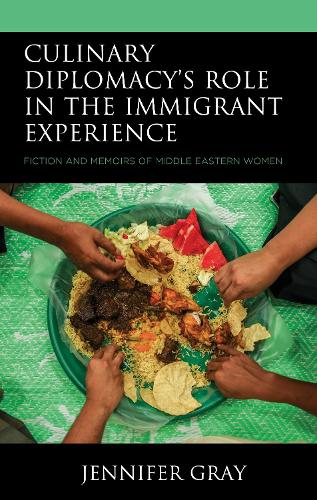
Culinary Diplomacys Role in the Immigrant Experience: Fiction and Memoirs of Middle Eastern Women
(Hardback)
Publishing Details
Culinary Diplomacys Role in the Immigrant Experience: Fiction and Memoirs of Middle Eastern Women
By (Author) Jennifer Gray
Bloomsbury Publishing PLC
Lexington Books
7th April 2021
United States
Classifications
Professional and Scholarly
Non Fiction
809.93564
Physical Properties
Hardback
144
Width 164mm, Height 229mm, Spine 18mm
404g
Description
In Culinary Diplomacy's Role in the Immigrant Experience: Fiction and Memoirs of Middle Eastern Women, the emergent field of literary food studies engages with international diplomacy studies to establish books with recipes as tools of culinary diplomacy. Foundational to the argument is culinary diplomacy scholar Sam Chapple-Sokols concept of Citizen Culinary Diplomacy which endorses public events that promote understanding of cultures and people. However, this study challenges that definition and argues that culinary fiction and memoirs are shared interactive experiences between the author, the readers, and the culture written about. Foundational to the study are twentieth century postcolonial literary theories of Homi Bhabha and douard Glissant and twenty-first century transnational theory of sociologists Julian Go and Ulrich Beck to recognize culinary diplomacy's vital role in international affairs. Culinary Diplomacys Role in the Immigrant Experience examines food as metaphorical expression in literature, and the impact of time, space, and place in developing diplomatic relationships between East and West in books by Diana Abu-Jaber, Donia Bijan, Joanne Harris, and Marsha Mehran.
Reviews
Her stimulating text excites readers to try the referred to cuisines and to read the novels explored in her critical analysis. In this vein, the reviewer wonders about what other immigrant communities and case studies could be explored through the lens of citizen culinary diplomacy and the research insights that could be gained through ethnographic interviews. Through her insightful, engaging text, Gray convinces her readers to savor each bite of a new dish as a transcultural experience that crosses time and space. Each mouthful becomes a delicious act of local diplomacy where travel and tourism only require stepping across the threshold into a new restaurant.
-- "Postcolonial Studies"In this innovative study, Dr. Gray builds a compelling case for understanding culinary fiction and memoirs as participating in diplomacy. As she brings familiar authors and chefs into conversation with lesser known culinary voices, Gray highlights how writing about food facilitates connections across temporal, spatial, and cultural divides. Her insights about culinary diplomacy traverse disciplinary borders resulting in an engaging work with wide appeal to audiences interested in food studies, women's and gender studies, and contemporary global literature.
--Laura White, Middle Tennessee State UniversityJennifer Gray so generously serves up a tasty meal, full of flavors and aromas of Middle Eastern dishes (stuffed grape leaves, lamb stew, yoghurt sauce, Moroccan couscous, baklava) prepared by female characters in a wide range of novels and memoirs, some which even contain recipes. Tehran, L.A., and villages in Ireland and France become sites of citizen culinary diplomacy displaying a variety of experiences involving migration, transcultural interaction, travel, food, and the Middle East. Gray's point is clear, compelling, and timely: Hospitality and cuisine can break through barriers between cultures, religion, and language, particularly barriers between Muslims and their neighbors. Eat up and enjoy the banquet!
--Allen Hibbard, Middle Tennessee State UniversityReading and rereading two culinary novels by my daughter, Marsha, has always given me the joy and happiness she had expected her books bring to her readers. But reading the critical and insightful literary analysis by Dr. Jennifer Gray bestowed me with an in-depth comprehension of how Marsha's writings function as a means for better understanding of different cultures and cultural differences, and how Marsha has consciously and cleverly, combined meaningful words, metaphors, and imagery to create literary artworks that give readers a true pleasure of reading as well as an understanding and appreciating of our humanity.
--Abbas Mehran, Marsha Mehran's fatherRelying on and expanding Chapple-Sokol's concept of Citizen Culinary Diplomacy, the book brings forth a unique understanding of food and identity in the twenty-first century in order to allow further discussions on the importance of transcultural culinary ties in an increasingly globalized world. Dr. Gray navigates between fiction, memoirs, and autobiographies to add on this nascent area of study within major postcolonial theories.
--Lava Asaad, Auburn UniversityWe have always looked at food and food recipes in works of fiction as a way of preserving cultures or an attempt at reaffirming a connection with the distant homeland for a diasporic writer living in the third space. Dr. Gray rather considers food in diaspora fiction as a culinary bridge and a negotiation for peace between the diasporic culture and the host land in its purest and most pleasant and humanistic yet powerful form.
--Lama Al-harbi, assistant professor of English, King Saud UniversityAuthor Bio
Jennifer Gray is assistant professor of English at Tennessee Tech University.
